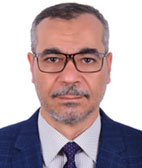The educational program in Head & Neck Anesthesia and Advanced Airway Management Fellowship will be 12 months in length and will be a complementary fellowship to other two years fellowships program.
Message form the Program Director

The fellowship programs are essential dimensions of the transformation of the medical student to the independent practitioner along the continuum of medical education. They are physically, emotionally, and intellectually demanding, and require longitudinally-concentrated effort on the part of the fellow.
Head & Neck Anesthesia and Advanced Airway Management Fellowship is to provide supervised training to board-certified or board eligible anesthesiologists in the practice of Advance Airway Management and Head & Neck Anesthesia. Fellows will have the opportunity to enhance their knowledge base and master the most advanced techniques of airway management. After completion of this one-years fellowship training, the individual should be able to manage the most complex and challenging airways and Head & Neck Anesthesia. The fellow will be familiar with techniques of invasive airway management and their corresponding indications, airway management algorithms, guidelines should be mastered and management of complex cases of head & neck Anesthesia. This one-year program will be a complementary fellowship to other two years fellowships program.
Objectives of HANAAM fellowship:
Perform competently all procedures considered essential for the area of practice including:
- Evaluation of airway imaging study using Virtual Endoscopy (VE) and 3 D reconstruction using CT scan and MRI study.
- Ultrasound examination of upper airway including lung ultrasound.
- Performing bedside airway assessment by flexible naso-endoscopy and variety of advanced airway management skills.
- Demonstrate and understanding of the pharmacokinetics and pharmacodynamics of inhalational anesthetics, intravenous anesthetics, local anesthetics, and opioids and their effects on airway management.
- Demonstrate and understanding of the practice guidelines in airway management and its pathways in complex airway management scenarios like (ASA) difficult airway Algorithm and (DAS) guidelines.
- Demonstrate understanding of perioperative acute pain management and its effect on the airway – especially the effect of opioids.
- Perform transtracheal, superior laryngeal, and glossopharyngeal nerve blocks.
- Demonstrate the ability to critically evaluate airway-related literature and apply scientific evidence to decision making.
- Demonstrate the ability to effectively supervise the clinical care of adult and pediatric patients by more junior trainees and other anesthesia providers.
- The surgical procedures range from major head and neck cancer surgery to complex laryngeal surgery, transoral robotic surgery (TORS), surgery for obstructive sleep apnea,
- Advanced neurotologic and skull base surgery, functional endoscopic sinus and pituitary surgery, facial plastic surgery, as well as
- Managing all maxillofacial and orthognathic surgery.
Dr. Nabil A. Shallik
Sr. Consultant Anesthesia,
Anesthesia Department IT Deputy Chair and Airway lead, HMC, Qatar.
Director of Head and Neck Anesthesia and Advanced Airway Management Fellowship,
A/Prof. Clinical Anesthesiology, Weill Cornell Medical College in Qatar,
A/Prof. Clinical Anesthesiology, Qatar University, Qatar.
nshallik@hamad.qa
